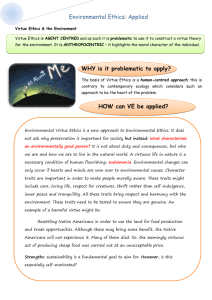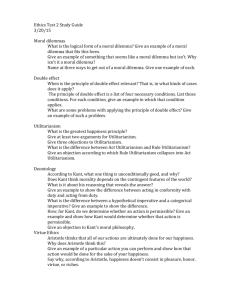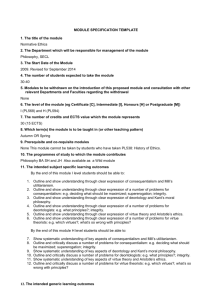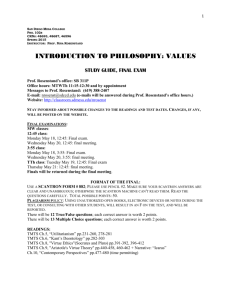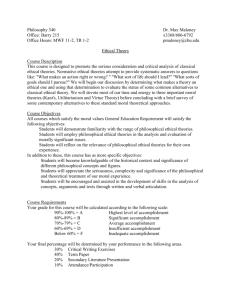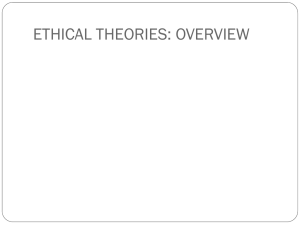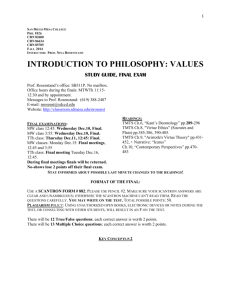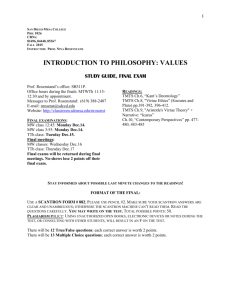Chapter Two: Which theories of ethics contend that right and wrong
advertisement
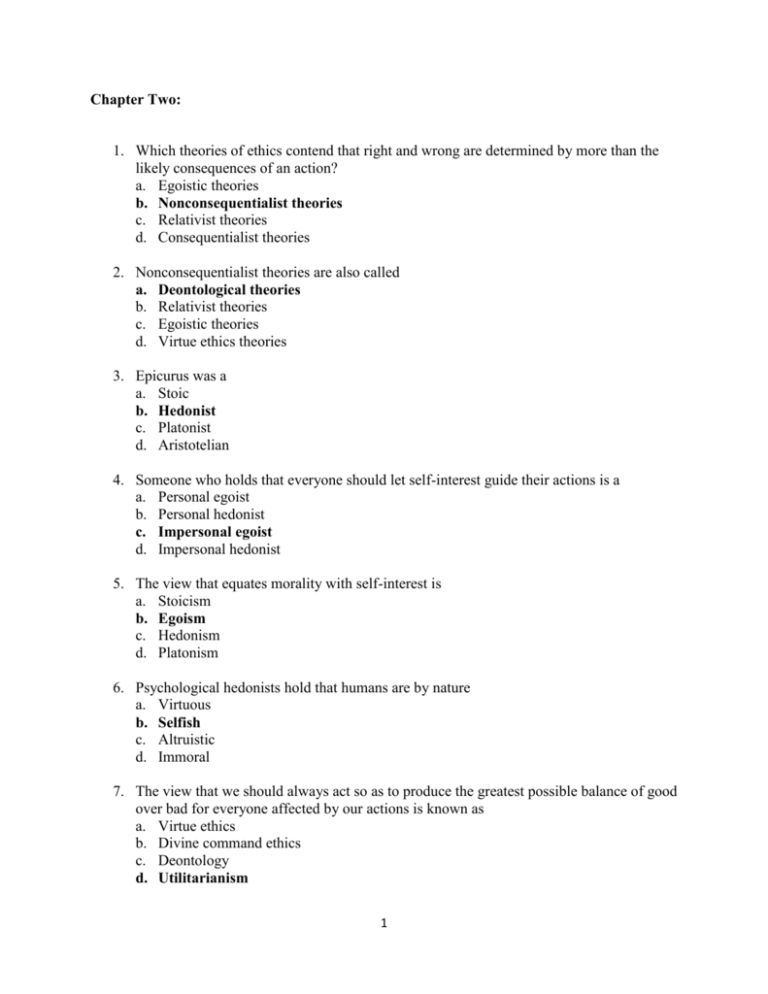
Chapter Two: 1. Which theories of ethics contend that right and wrong are determined by more than the likely consequences of an action? a. Egoistic theories b. Nonconsequentialist theories c. Relativist theories d. Consequentialist theories 2. Nonconsequentialist theories are also called a. Deontological theories b. Relativist theories c. Egoistic theories d. Virtue ethics theories 3. Epicurus was a a. Stoic b. Hedonist c. Platonist d. Aristotelian 4. Someone who holds that everyone should let self-interest guide their actions is a a. Personal egoist b. Personal hedonist c. Impersonal egoist d. Impersonal hedonist 5. The view that equates morality with self-interest is a. Stoicism b. Egoism c. Hedonism d. Platonism 6. Psychological hedonists hold that humans are by nature a. Virtuous b. Selfish c. Altruistic d. Immoral 7. The view that we should always act so as to produce the greatest possible balance of good over bad for everyone affected by our actions is known as a. Virtue ethics b. Divine command ethics c. Deontology d. Utilitarianism 1 8. Jeremy Bentham and John Stuart Mill both endorsed a. Virtue ethics b. Divine command ethics c. Deontology d. Utilitarianism 9. By “good” utilitarians mean a. Happiness or pleasure b. Morality or virtue c. Wealth or prosperity d. Desire satisfaction 10. The “hedonic calculus” was developed by a. Epicurus b. Mill c. Bentham d. Kant 11. A. C. Ewing criticized a. Deontological principles b. Act utilitarian principles c. Virtue ethics d. Divine command theory 12. Adam Smith argued that if business is left to pursue its own self-interest a. The good of society will be served b. The morality of society will be undermined c. Great injustices will develop d. The good of society will be undermined 13. The view that it is morally acceptable for individuals to pursue their own self-interests while engaged in business is called a. Business privilege b. Business egoism c. Business hedonism d. Business practice 14. Kant believed that moral rules can, in principle, be known from a. Observation only b. God’s revelation c. Reason alone d. The use of intuition 15. For Kant, nothing is good in itself except a. God’s law 2 b. God’s will c. A good will d. Good consequences 16. Kant’s theory is a. Utilitarian b. Egoistic c. Nonconsequentialist d. Hedonistic 17. For Kant, the subjective principle of an action is known as a a. Rule b. Virtue c. Imperative d. Maxim 18. Kant held that a moral law must have a. Good consequences b. Universal acceptability c. Particular acceptability d. Religious backing 19. Kant held that humanity should always be treated as a. Mere means b. Ends in themselves c. Instruments of will d. Utility maximizers 20. The unnecessary buying and selling of stocks to generate commissions is known as a. Gouging b. Churning c. Emptying d. Stocking 21. W.D. Ross believed that all (or most) of our obligations are a. Kantian obligations b. Utilitarian obligations c. The obligations of etiquette d. Prima facie obligations 22. The ethical perspective of W.D. Ross is a. Monistic b. Pluralist c. Theistic d. Epicurean 23. The view that the utilitarian standard should be applied to moral codes as a whole is 3 a. b. c. d. Act utilitarianism Rule utilitarianism Virtue utilitarianism Prima facie utilitarianism 24. According to V. R. Ruggiero, how many concerns are common to most ethical systems? a. Two b. Three c. Four d. Five F 1. All egoists endorse hedonism. T 2. Egoists can identify the good with knowledge. T 3. A common objection to ethical egoism is that it ignores blatant wrongs. F 4. Bentham and Mill had the same conception of pleasure. T 5. Actions affect people to different degrees. F 6. Utilitarianism requires us to disregard our own pleasure. T 7. Utilitarianism provides a clear and straightforward basis for formulating and testing policies. T 8. Under eminent domain the government can appropriate private property for public use. T 9. Kant’s categorical imperative holds that we should always act in such a way that we can will the maxim of our action to be universal law. F 10. W. D. Ross endorsed utilitarianism. F 11. A prima facie obligation cannot be overridden. T 12. Human rights are universal. 1. Outline both act utilitarianism and rule utilitarianism, making it clear how they are different from each other. Of these two utilitarian theories, which do you believe is the most persuasive, and why? Do you believe that we should accept this approach to ethics? Why, or why not? Justify and illustrate your answers by reference to how utilitarianism could held in formulating policies within an organization context. 4 2. What is W.D. Ross’s view of ethics? How does it differ from the views of Mill and Kant? Do you believe that this view of ethics is applicable to a business setting? Why, or why not? Do you believe that it should be accepted generally? Do you think that your answers to the last two sub-questions should be the same, or should they differ? Why do you think as you do? 3. Outline Kant’s account of ethics. How, according to Kant, should we treat people—and why does he believe this? Do you agree? If we accepted a Kantian approach to morality, would we need to change how we conduct business? If so, provide examples to illustrate your claims and explain why Kant would require the changes you outline. If not, why not? 4. Do you believe that businesses should adopt a policy of business egoism? Would such a policy be best suited to the nature of business or not? Why do you believe as you do? 5. Do you believe that humans are naturally selfish? Explain your answer. Does your answer to this question have any ramifications for (a) which moral theory we should adopt, and (b) how we should structure business organizations? 6. What do you believe the optimal moral code should look like? Do you believe that people would be intrinsically motivated to follow such a code, or not? If so, why do you believe as you do? If not, how should they be motivated to behave morally? 5

